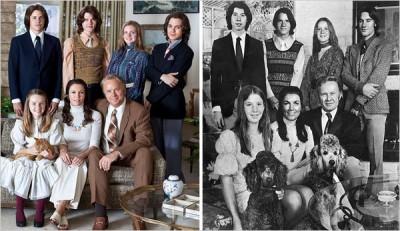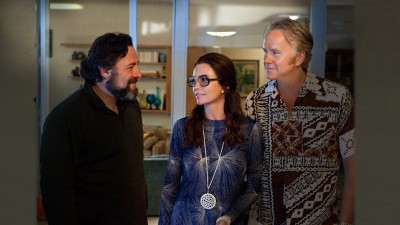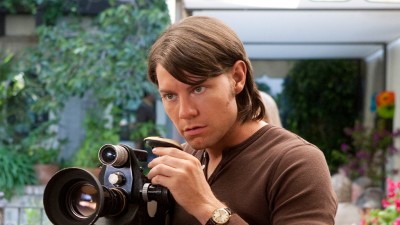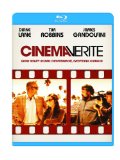| Reviews & Columns |
|
Reviews DVD TV on DVD Blu-ray 4K UHD International DVDs In Theaters Reviews by Studio Video Games Features Collector Series DVDs Easter Egg Database Interviews DVD Talk Radio Feature Articles Columns Anime Talk DVD Savant Horror DVDs The M.O.D. Squad Art House HD Talk Silent DVD
|
DVD Talk Forum |
|
|
| Resources |
|
DVD Price Search Customer Service #'s RCE Info Links |
|
Columns
|
|
|
Cinema Verite

Please Note: The images used here are taken from promotional materials provided by HBO Films, not the Blu-ray edition under review.
I have never seen the groundbreaking 1973 PBS documentary series An American Family, but I have long been aware of it; it's often cited as the first step American TV took toward the televised "reality" that's proven as enduringly popular as it is culturally (and sometimes ethically) troubling. In its own time, it caused widespread chattering-class discussion and criticism, not to mention record ratings for PBS, the network that produced and broadcast it. For the Louds -- the SoCal brood around which the show centered, who strongly resembled, at least from the outside, the "typical," upwardly mobile suburban nuclear family -- to allow a documentary crew to record their private life and then share it with the American public raised eyebrows: Were these people exhibitionists? Had they no dignity or shame? Was anything to be truly private in the TV age? And that was even before the actual airing of what turned out to be the Louds' typically dirty (or at least grayish) laundry -- so unlike those spotless, pleasant, fictional Bradys. They presented an utterly unglamorous, uncomfortable image of the American family, one much more complicated and less amusing than anything the sycophantic boob tube had ever come up with, and America loved to hate what it saw in itself. (It was, to be fair, a very apt time for that.) The 2011 HBO film Cinema Verite, written by David Seltzer (The Omen) and directed by Shari Springer Berman and Robert Pulcini (American Splendor, The Nanny Diaries), takes on the tricky challenge of dramatizing the Louds' experience as they became the dubious Neil Armstrongs of reality television, taking one giant leap from having their idiosyncrasies and troubles play out safely behind closed doors to being a public exhibit illustrating most all of the common but not easily accepted pitfalls to which a seemingly "normal" American family could fall prey.
Berman and Pulcini had the great good fortune to land Tim Robbins for family patriarch Bill Loud, a glad-handing Republican-businessman type and womanizer who brings home the bacon but is seldom to be found at home himself, and Diane Lane as wife and mother Pat Loud, a nascent feminist who's belatedly resisting the doormat role she's been willingly confined to for so long. They also have James Gandolfini as Craig Gilbert, the TV producer to whom the Louds had been recommended by a mutual acquaintance as the perfect subjects for his harebrained TV-documentary idea. Gilbert plays up the kindred-spiritedness (and, soon enough, significantly more) between him and Pat, who, like any sane person, has some serious reservations about giving the world access to her and her family's life on a 24/7 basis. But Gilbert knows how to win over the educated, malcontented Pat: he convinces her that the Louds will be making an altruistic move for which everyone will appreciate and admire them, engaging in an important sociological investigation that will educate, inform, and somehow improve all American families.

Both Gilbert and Pat have mixed motives, but neither is a villain, and both have some real interest in the purported edifying aspects of the project. Calling Gilbert's benevolence into question, however, are his TV producer's instincts for a hit and his presentation of his constant, persistent pushing of any boundary between education and exploitation as a matter of principle, which in turn clashes not only with the sounder principles (some privacy and self-respect) that Pat herself tries to maintain but, more worryingly, those of his intrepid young husband-and-wife camera crew, Alan and Susan Raymond (Patrick Fugit (Almost Famous, Saved! and Shanna Collins), post-'60s idealists committed to creating something "pure." Unlike Gilbert, who breezes in to woo Pat with flattery and attention when she balks, Alan and Susan become close to the Louds through the sheer amount of time they spend in the family's presence, bearing personal and cinematographic witness to their intimate interactions and eventually having their equally distributed affections torn as they watch Pat's long-dwindling feeling toward her husband positively curdle under their klieg lights. For his part, the anachronistic Bill is just as lost as Pat; he works hard, plays hard, feels victimized by his striking workers, and can no more comprehend his family's inscrutable dissatisfactions and demands than he can those of the pesky unions. (And, for the ultimate in squareness, and in contrast to his wife's slightly uncomfortable but gracious acceptance of the ahead-of-its-time flamboyance of their gay son, Lance, Bill persists in the belief that a steady job and meeting the right girl will lead Lance back onto the right path and off of the one that has him crashing at New York's Chelsea Hotel in pursuit of a slot in Warhol's cast of hustler/drag queen Superstars.) The space in front of the cameras, which is now anywhere they happen to be, becomes an arena in which Bill and Pat, their marriage and family falling apart, vie to be the sympathetic, understood, justified, and vindicated one in the eyes of their children, their community, the omnipresent Alan and Susan, and, in their unique case, a TV audience that will see it all months later.
There are lots of layers, both within these conflicted, lost, but resilient people and in Cinema Verite's plot, which has us watching a film in which the characters are constantly being filmed. Seltzer, Berman, and Pulcini have a very good handle on the richness of the situation, evoking the peculiarity of the Louds' experience and of their own project by occasionally cutting to an editing table for a simultaneous, side-by-side look at both An American Family and their fictionalized Louds, and by judiciously, adroitly switching back and forth between the film's principal 35 mm cinematography and the grainier, 16 mm footage that we see Alan and Susan shooting of their subjects. The directors, along with cinematographer Alfonso Beato (All About My Mother, Ghost World) and production designer Patti Podesta, also do a strikingly accomplished job of, for example, differentiating the film's East Coast locales from its primary Santa Barbara settings with subtle but effective changes in tone, color, and "temperature" via clever but unshowy camera and lighting choices. There is nothing spectacularly personal or distinctive in their style, but Berman and Pulcini have a modest playfulness and a nice sense of proportion and composition; they're quite fluent and articulate in the language of cinema, even when working on the small screen as they are here.

And the cast, for their part, are more than up to exploring the murky, tangled depths of their characters. It's really Robbins's, Gandolfini's, and, especially, Lane's show; they're all playing people confronted with the opportunities and threats of a shifting culture in which what it means to be a family is no longer as oppressive -- or as comfortingly certain -- as it was just a short time ago, and the actors are incredibly adept at getting inside their characters' adaptive/coping strategies. In this way Cinema Verite resembles Ang Lee's devastating 1997 masterpiece The Ice Storm; to the confusion of their children (and themselves), Bill and Pat Loud are, much like the Kevin Kline and Joan Allen characters in Lee's film, naive and sheltered people who imagine themselves to be terribly sophisticated and who respond to the scary new roles and freedoms now trickling behind the picket fences by striking with-it poses that are mostly bravado, serving only to mask (and not all that well) their pain and uncertainty.
To compound the difficulty of actually living through what was (selectively) shown of their lives in An American Family, the Louds were publicly reviled upon the show's airing in a way only people who have hit a sore spot could be, and subsequently went on a one-family crusade, touring all the talk shows to explain their decision to participate in Craig Gilbert's idea, and to defend their flaws and foibles from an onslaught of judgment. Oddly, the phenomenon that finally pulled apart the Louds' cracking facade reunited them when they had to shield each other from the mocking, scornful public glare resulting from the show (which, in its final edit, the family had mixed feelings about at best). This reunification provides Cinema Verite's dramatic coda, followed quickly by a rather conventional where-are-they-now wrap-up montage that seems obligatory for any film based on a true story, but which almost always dulls the edge of a film's conclusion (for one immediate example, the same thing was utterly extraneous in In Darkness).

That final bit of banality isn't the only one that compromises Cinema Verite. There are draggy bits of coasting here and there: Seltzer's script too often demands a conventional TV-movie, by-the-numbers biopic structure that even Berman and Pulcini's craft and their wonderful actors can't make anything special out of, and Rolfe Kent's score, though suitable for the most part, sometimes telegraphs quirkiness too emphatically, which infuses an unpleasant whiff of smarmy, inconsequential satire when everything else is working toward a much more interesting empathy and gravity. Still, the best impulses of directors and cast are realized more than often enough to give the film a surprising amount of emotional heft, steering well clear of simplistic judgment, facile self-righteousness, or cheap laughs. By viewing them as human beings first, and only then as An American Family, the makers of Cinema Verite make the Louds' story resonate in a way more moving and humane than was ever possible by way of the TV experiment through which they made their name.
THE BLU-RAY DISC:
The AVC/MPEG-4, 1080/24p, 1.78:1 aspect-ratio transfer is superb; this is a colorful production, and all of those colors pop beautifully. Skin tones look perfectly natural, all blacks are solid, and there are no compression artifacts whatsoever to be discerned.
Sound:The DTS-HD Master Audio soundtrack is widely dimensional, vivid, crisp, and clear -- everything sounds fantastic, with no distortion, imbalance, or any other audio flaws.
Extras:--An audio commentary with directors Shari Springer Berman and Robert Pulcini and star Diane Lane, in which directors and actress warmly recall the day-in/day-out of making the film (Santa Barbara, for example, doesn't look anything like it did in An American Family, so they had to re-find it in older parts of L.A.) as well as their extensive preparations -- consultations with the real Louds, endless rewatching of the rare copy of the documentary they were able to get their hands on, and, for Lane in particular, finding a way to hone in on and inhabit the film's complex characters. Berman and Pulcini come across as considered, methodical, drily funny personalities, while Lane is a passionate artist with a sense of humor keeping her grounded, so it's quite enjoyable and enlightening to pass the film's 90 minutes once again in their company.
--A 3-1/2-minute behind the scenes that's really just one of those HBO teasers with cast and directors talking up the project. Better than most things of this nature, but still much more promotional than revelatory.
FINAL THOUGHTS:If you can look beyond the occasional TV-movie, biopic blandness of Cinema Verite, there are moments of emotional urgency awaiting you that are as powerful as anything in The Ice Storm, the film this one most closely resembles in its '70s period and themes of tensions and vulnerabilities plaguing a well-off, "sophisticated" suburban family. The family whose story is told here, however, really existed, and they were the first people to have their "reality" shot and shaped into a TV series, so the film also boasts that added layer of relevance and some incisive (while surprisingly sensitive, nonjudgmental, and nuanced) observations regarding what effects on one's reality the presence of cameras and the knowledge of an eventual huge audience might have -- consequences that can linger, in actual reality, well beyond the final cut and its mass consumption. Add to that the first-rate craft that directors Shari Springer Berman and Robert Pulcini bring to the proceedings and the remarkable performances (particularly those of Diane Lane and Tim Robbins as the sad, chronically dissatisfied couple whose painfully failing marriage will make for such great ratings, and James Gandolfini as the producer who, despite his sincere affection for the family he wants to bring into America's living rooms, badly wants and needs those ratings), and you have the makings of an overall solid, thoughtfully and creatively done, sometimes unexpectedly powerful drama. Recommended.
|
| Popular Reviews |
| Sponsored Links |
|
|
| Sponsored Links |
|
|
| Release List | Reviews | Shop | Newsletter | Forum | DVD Giveaways | Blu-Ray | Advertise |
|
Copyright 2024 DVDTalk.com All Rights Reserved. Legal Info, Privacy Policy, Terms of Use,
Manage Preferences,
Your Privacy Choices | |||||||













